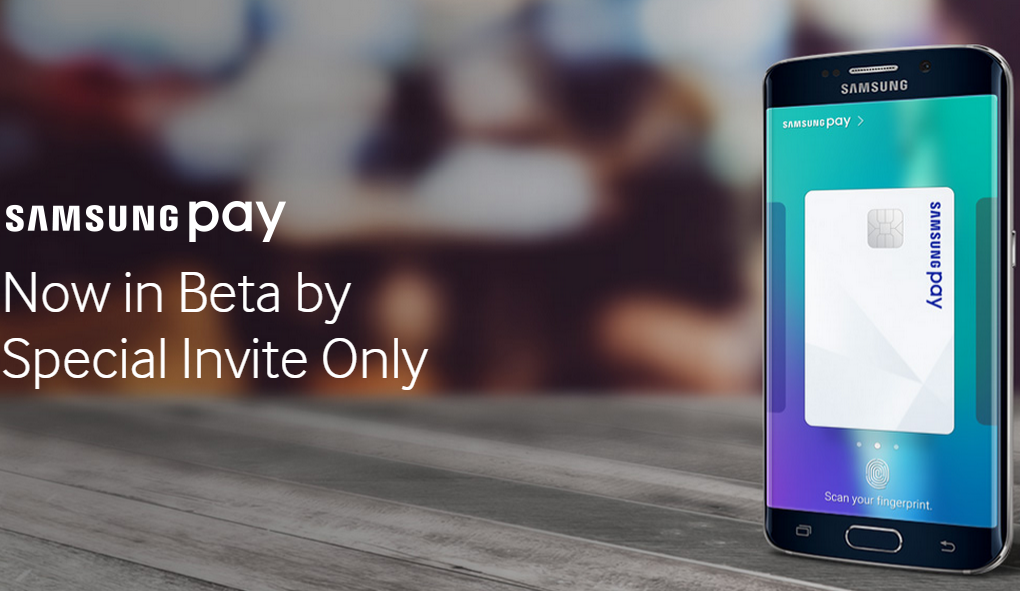Samsung Pay Now In Beta, Invitations Available In The U.S.
Samsung Pay invitations can now be requested from Samsung if you own one of the following devices: Galaxy S6, Galaxy S6 edge, Galaxy S6 edge+ or Galaxy Note 5. You also need to be on AT&T, Sprint, T-Mobile or US Cellular.
Verizon doesn't yet support Samsung Pay, and it's still "evaluating" it. However, it's not clear why this should be a carrier's job, nor why Verizon wants to become a middleman between Samsung and its customers. Verizon, along with AT&T and T-Mobile, have already given up on any intention of being in the mobile payments market when they sold Softcard (former Isis Mobile Wallet) to Google.
Samsung customers who want to use the Samsung Pay service will also need an active Samsung account, a "qualifying card" from Bank of America MasterCard and Visa, or a U.S. Bank Visa.
The qualifying cards include:
Bank of America consumer credit, debit cards, small business debit cards (owner card only), Merrill Lynch consumer credit cards, U.S. Trust consumer credit, debit cardsU.S. Bank consumer or small business Visa credit and debit cards, Elan Financial consumer or small business Visa credit card
Customers who are accepted will receive an email notification from Samsung.
Samsung Pay can work much like Apple Pay, through a secure NFC channel, and it can also use tokenization to create random numbers that can be accepted by the point-of-sale (POS) terminals as virtual credit card numbers, to make the transaction. However, this feature isn't yet supported by the vast majority of stores in the U.S. -- just a few larger chains.
Get Tom's Hardware's best news and in-depth reviews, straight to your inbox.
Samsung bought LoopPay earlier this year, which used a technology called Magnetic Stripe Transmission. This technology can emulate how a mag stripe card works by creating a similar magnetic field within three inches of the POS terminal, and then allow the smartphone owner to make the purchase.
Because it essentially replicates a mag stripe, Samsung Pay could be used at the vast majority of stores in the U.S. Ultimately, though, most of those stores will also upgrade their terminals to ones that accept the more secure NFC-based and tokenized transactions. However, that could take a few more years, and if Samsung's phones remain popular, they could power a significant number of contactless mobile payments in the U.S.
Follow us @tomshardware, on Facebook and on Google+.
Lucian Armasu is a Contributing Writer for Tom's Hardware US. He covers software news and the issues surrounding privacy and security.
-
g-unit1111 After getting my bank account hacked from a hotel Wifi last year, and losing $1700 in the process, I will refuse to participate in any form of cell phone credit card service. No thank you sir. :no:Reply
And that goes double for one that's in beta form. :lol: -
targetdrone Unless the new Chip based pin pads that all merchants are required to upgrade to by October already include a NFC reader no one is going to accept this.Reply
And soon Mag strips won't even be accepted so even if there were a way to replicate a magnetic signal so this feature were compatibility with old style pin pads, it still won't be accepted. -
smleth Ok, Now this is getting stupid.Reply
Yeah, let create 50 different phone payment services so everyone has something different. Stores are going to have to start putting up stickers all over their doors and windows on which ones they support. That's really going to help this be adopted. -
g-unit1111 Reply16538282 said:Ok, Now this is getting stupid.
Yeah, let create 50 different phone payment services so everyone has something different. Stores are going to have to start putting up stickers all over their doors and windows on which ones they support. That's really going to help this be adopted.
I agree, not only is it stupid, it's also dangerous if stores don't have secured Wifi. Someone goes to make a payment using Samsung Pay, or Apple Pay, or whatever Pay, and gets hacked, bye bye store! :ange:
